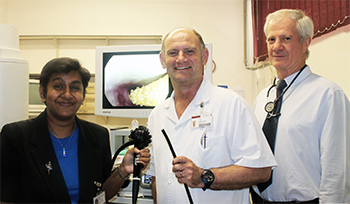Latest News Archive
Please select Category, Year, and then Month to display items
01 March 2023
|
Story Alicia Pienaar
 Prof Mathys Labuschagne is the Head of the Clinical Simulation and Skills Unit within the School of Biomedical Sciences in the Faculty of Health Sciences
Prof Mathys Labuschagne is the Head of the Clinical Simulation and Skills Unit within the School of Biomedical Sciences in the Faculty of Health Sciences
The Dean of the Faculty of Health Sciences, Prof Gert van Zyl, invites you to the inaugural lecture of Prof Mathys Labuschagne, Head of the Clinical Simulation and Skills Unit within the School of Biomedical Sciences in the Faculty of Health Sciences.
Subject: Clinical Simulation: Quo Vadis?
Venue: Auditorium, Equitas Building, Bloemfontein Campus
Date: 8 March 2023
Time: 17:30
RSVP on or before Friday 3 March 2023
Light refreshments will be served after the inaugural lecture.
About Prof M Labuschagne
Prof Mathys Labuschagne is the Head of the Clinical Simulation and Skills Unit within the School of Biomedical Sciences in the Faculty of Health Sciences at the University of the Free State. He completed his MB ChB degree and qualified as an ophthalmologist in 2006.
He developed an interest in health professions education and obtained a PhD in Health Professions Education in June 2012. The title of his thesis was: Clinical Simulation to enhance undergraduate medical education and training at the University of the Free State.
Prof Labuschagne was appointed Head of the Clinical Simulation and Skills Unit at the University of the Free State. The facility is utilised for undergraduate and postgraduate clinical simulation training, as well as interprofessional training and research. He has a special interest in simulation as training tool, precision skills training, and mastery of learning and simulation as tool to prepare students for interprofessional education and collaborative practice.
Prof Labuschagne is part of a multi-institutional consortium that developed the MySkills Medic app. It is a clinical procedural skills application aimed at graduating medical students, interns, and community-service doctors. He was appointed as a member of the Ophthalmology Foundation Education Simulation Subcommittee (affiliate of the International Council of Ophthalmology) tasked with developing a white paper to guide simulation training for ophthalmologists. He is involved in postgraduate supervision for master’s and PhD students in HPE.
Gastroenterology Unit works to bring a transformative impact to healthcare
2016-11-21

Dr Rita Nathan, Acting CEO of Universitas Hospital,
Prof Willem Kruger, Acting Head of the
School of Medicine, and Prof Jan van Zyl,
Head of Department of Internal Medicine.
Photo: Nonsindiso Qwabe
The departments of Surgery and Internal Medicine at the University of Free State launched the newly upgraded Gastroenterology Unit of the Universitas Academic Hospital on 8 November 2016. Realising the need to provide state-of-the-art equipment that caters for various health needs, the unit has acquired new pieces of equipment worth R7 million. Through the equipment, a move towards the digital revolution, the unit hopes to bring about a transformative impact on healthcare service delivery in central South Africa and its surrounds.
Upgraded unit will make a difference on burden of diseases
Dr Rita Nathan, Acting CEO of the Universitas Hospital, said the increase in the number of scopes, and the improvement in technology, will facilitate improved service delivery to the community of the Free State and beyond. “This upgrade will enable the unit to make a tremendous dent in the burden of diseases in the communities we serve.”
Unit a unique feature in central South Africa
Serving a population from the Free State, Northern Cape, Eastern Cape and Lesotho; the growing demand of health services has led to an increase in the number of patients treated by the unit. This unit is unique in central South Africa as the only one providing endoscopic intervention for cases like gastrointestinal bleeding. It is also the only 24-hour gastroscopic service available in the state sector.
Improved service delivery linked to enhanced training platforms
Prof Willem Kruger, acting head of the School of Medicine, said that the upgrading of equipment will have an immense impact on not only service delivery, but also on training platforms in the latest technologies. “It important, as a university, that our doctors have the latest technology at their disposal to facilitate training. If training improves, service delivery improves. The two on inextricably linked.” he said.